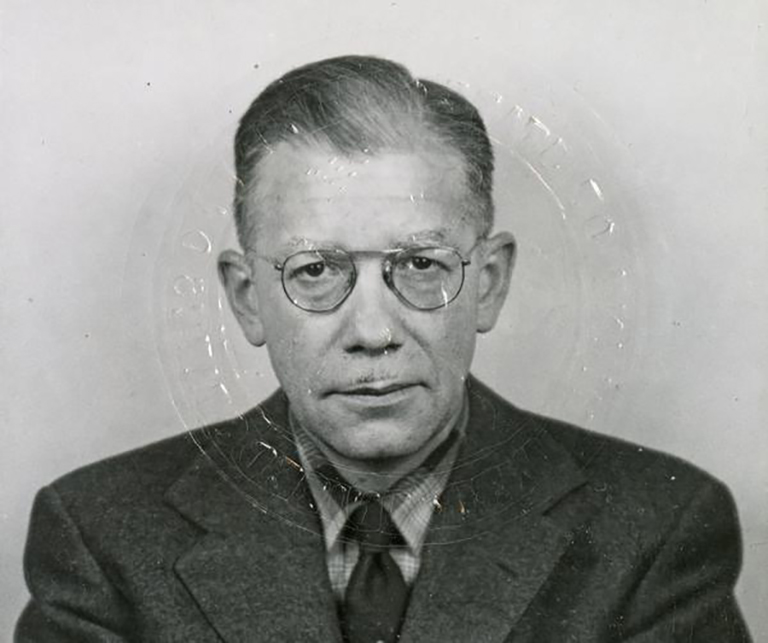by Isabel Piedmont-Smith and Lauren Anderson
Department History
“Gravvy will be fondly remembered as a true exemplar of the scholarly and the gentlemanly life,” wrote Professor Roy Leake on the occasion of Francis Gravit’s retirement as professor of French in 1975. “From his trade-mark beret to his renowned coq au vin, ‘Gravvy’ – as he was familiarly addressed – loved all things French,” wrote Professor Emeritus Richard Carr in 2007. Above all, “Francis Gravit was in many ways and for many years the backbone of the French Department.”

Born in Ekhart, Indiana in 1904, Francis West Gravit graduated with a BA in French from Oberlin College in 1928. Thanks to a personal journal from 1926 held at the IU Archives, we can gain some insight into his life as an undergraduate student. Writing about the pangs of unrequited love, cramming for exams, and attending college sports matches, Gravit’s journal is oddly reminiscent of the university experience today. As he worries about flunking chemistry, complains about his teachers, and contemplates cutting class, one thing above all else is apparent: his deep passion for French language and culture.
Gravit pursued his graduate studies in French at the University of Michigan beginning in 1928, married Marjorie (neé Smith, also an Oberlin graduate) in 1930, and completed his Ph.D. in 1939. His dissertation, “Peiresc, Patron of Scholarship,” examined the life and work of Nicolas-Claude Fabri de Peiresc, a French astronomer, scholar, and patron of scientific learning who lived 1580-1637. The thesis marked the beginning of Gravit’s lifelong dedication to 17th-century French studies. He continued to teach at the University of Michigan until 1942, and then both he and Marjorie worked for the US Navy during World War II, decoding enemy messages. After the war, he taught for three more years at Michigan and then joined the Department of French & Italian at Indiana University-Bloomington in 1948.
Professor Gravit was devoted to the pursuit of excellence in French language and diligent in his service to the Department. He directed all first- and second-year French language courses until the late 1960’s, and pioneered the shift away from a grammar-focused approach toward a more communicative approach to language learning. To support the new oral/aural language learning, Gravit helped establish what was then a state-of-the-art language lab in Ballantine Hall. He also developed (and graded!) a French placement exam for freshmen and created the F491-492 course sequence for graduate reading proficiency, which was then emulated by other language programs.
IU’s study abroad programs also owe a debt of gratitude to Francis Gravit, as he was instrumental in developing both the High School Honors Program in St. Brieuc, Brittany, and the junior year abroad program for IU students in Strasbourg.
Gravit’s main scholarly legacy is the MLA Bibliography of French 17th-Century Studies, published by the IU Press, which he edited 1954-1966. He was recognized by the government of France for his contributions to French studies in 1963, when he was awarded the Palme Académique by the French Ministry of Education, a distinguished and rare honor.
Beyond the classroom, Gravit was an avid traveler, enjoying many trips to France along with his wife Marjorie, whose education in art history informed their visits to museums, cathedrals and châteaux. At home in Bloomington, he and Marjorie opened their home and beautiful garden to many colleagues and friends. “He has been a gracious host to generations of colleagues and students,” wrote Leake, “who also know him as a bon vivant, a connoisseur of good things of life, an enjoyer of zestful cooking, racy wines, and sparkling conversation.”
Francis Gravit passed away in 1993 at the age of 88, while Marjorie lived into the new century and died in 2007 at the age of 101. Marjorie made a generous bequest to the Department by endowing the Francis and Marjorie Gravit Fund at the IU Foundation, to support scholarships for undergraduate students and fellowships for graduate students in French. The most recent Gravit Fellowship recipient is French linguistics Ph.D. candidate Scott Evans (M.A., 2017), who appreciated being able to focus on his dissertation during the Spring 2020 semester without teaching duties. Marjorie Gravit also has a scholarship in her name through IU’s Jacobs School of Music.
Francis’s eventful life and career reminds us of another important fact: life goes on, even in the wake of societal upheaval. Francis managed to graduate from high school during the Spanish Influenza pandemic, complete his Master’s degree during The Great Depression, and serve his country during World War II. During a visit to Paris in 1968, he even got caught up in the student riots and breathed a bit of tear gas. (“It was all very exciting,” he said later in an IU Student Journal article.) Despite the tumult around him, Professor Francis West Gravit made important contributions to the Department of French and Italian, leaving a legacy still appreciated today.
 The College of Arts
The College of Arts